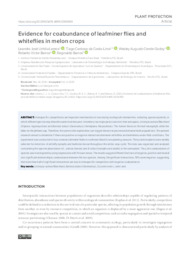Evidence for coabundance of leafminer flies and whiteflies in melon crops.
Evidence for coabundance of leafminer flies and whiteflies in melon crops.
Autoria: LEMOS, L. J. U.; COSTA-LIMA, T. C. da; GODOY, W. A. C.; BARROS, R. V.; BARROS, R.
Resumo: Interspecific competitions are important mechanisms in structuring ecological communities, including agroecosystems, in which different species may share the same food resource. In melons, two major pests coexist in time and space, Liriomyza sativae Blanchard (Diptera: Agromyzidae) and Bemisia tabaci (Gennadius) (Hemiptera: Aleyrodidae). The former feeds on the leaf mesophyll, while the latter on the phloem sap. Therefore, the same niche exploitation can trigger interactive processes between both populations. The present research aimed to determine if there are positive or negative interactions between whiteflies and leafminers under field conditions. The experiment was conducted in four commercial melon fields in northeast Brazil in two planting seasons. Thirty random plants were weekly selected for detection of whitefly nymphs and leafminer larvae throughout the entire crop cycle. The data was organized and analyzed considering the species abundance of L. sativae (larvae) and B. tabaci (nymphs and adults) in the same plant. Thus, the coabundance of species was investigated by using regressions with Poisson errors. The results suggest different fractions of negative, positive and neutral (not significant relationships) coabundance between the two species. Among 34 significant interactions, 56% were negative, suggesting that more than half of significant interactions are due to interspecific competition with negative coabundance.
Ano de publicação: 2021
Tipo de publicação: Artigo de periódico
Unidade: Embrapa Semiárido
Palavras-chave: Bemisia, Bemisia Tabaci, Cucumis Melo, Díptera Agromyzidae, Liriomyza, Melons, Melão, Mosca Branca, Praga, Região Semiárida, Vale do São Francisco
Observações
1 - Por padrão são exibidas publicações dos últimos 20 anos. Para encontrar publicações mais antigas, configure o filtro ano de publicação, colocando o ano a partir do qual você deseja encontrar publicações. O filtro está na coluna da esquerda na busca acima.
2 - Para ler algumas publicações da Embrapa (apenas as que estão em formato ePub), é necessário ter, no celular ou computador, um desses softwares gratuitos. Sistemas Android: Google Play Livros; IOS: iBooks; Windows e Linux: software Calibre.
Acesse outras publicações
Acesse a Base de Dados da Pesquisa Agropecuária (BDPA) para consultar o acervo completo das bibliotecas da Embrapa.

